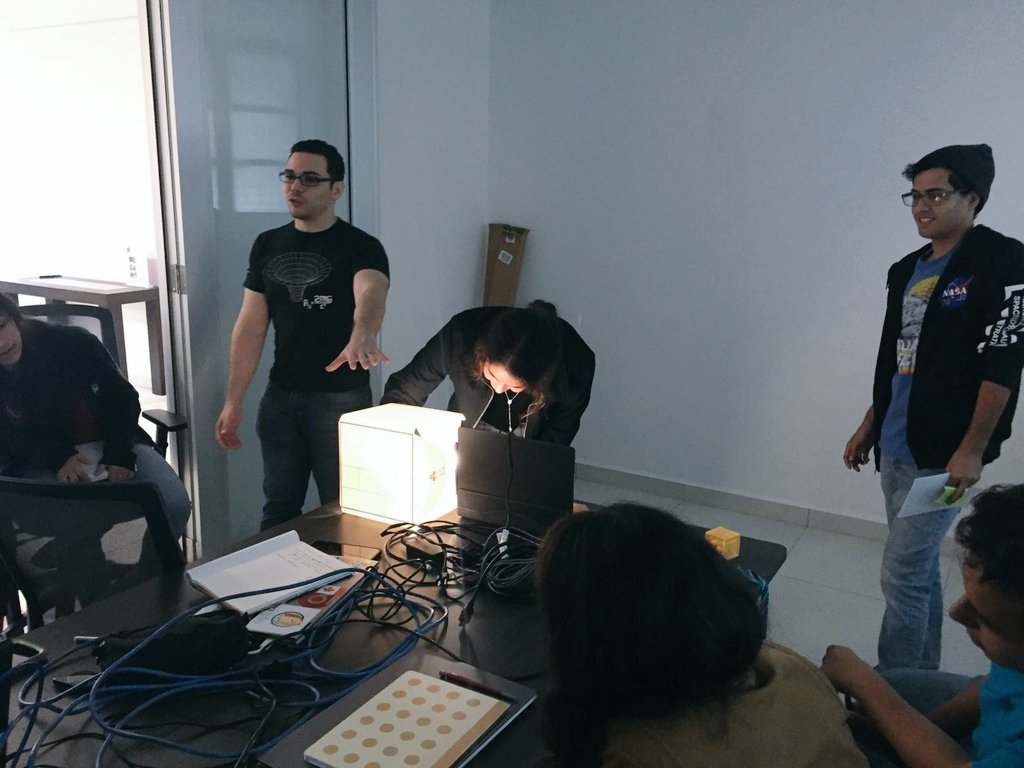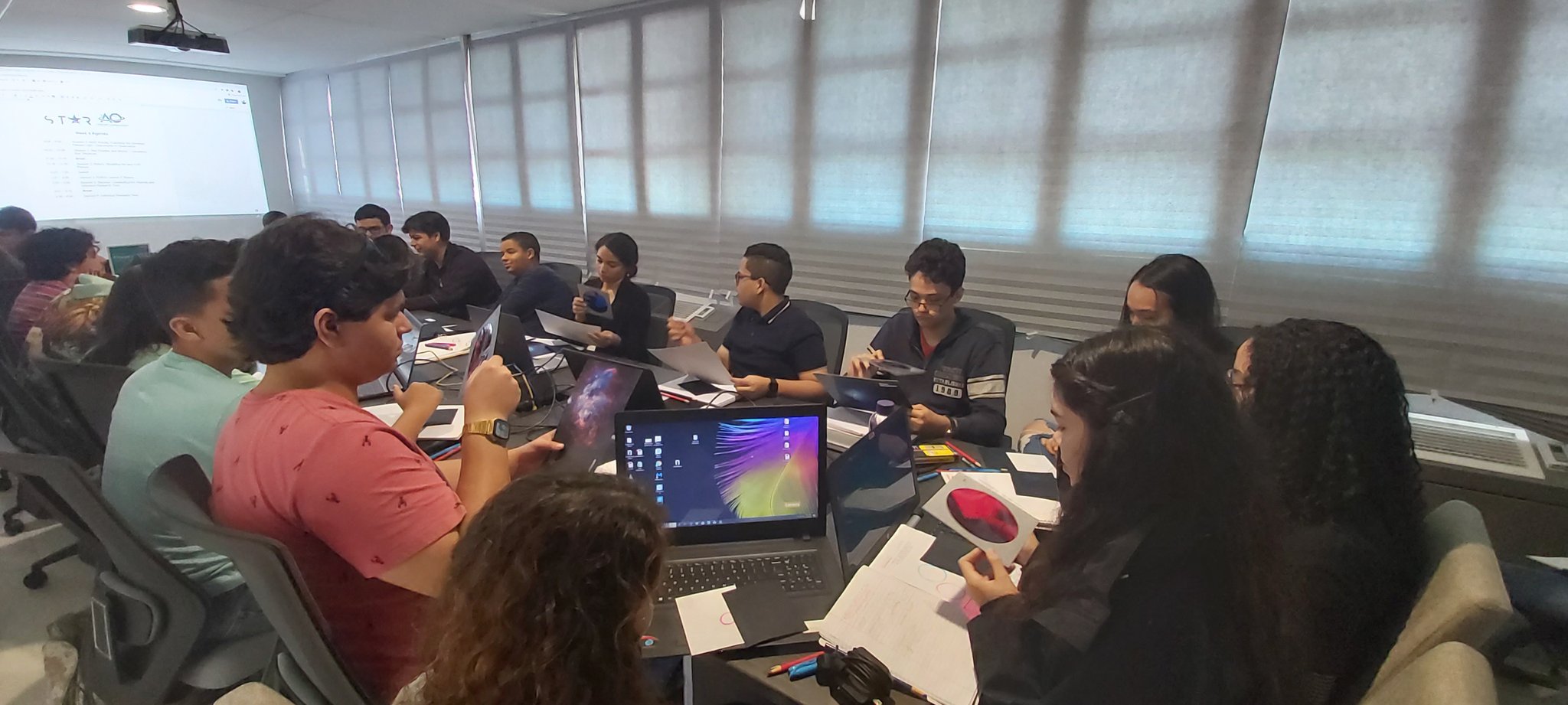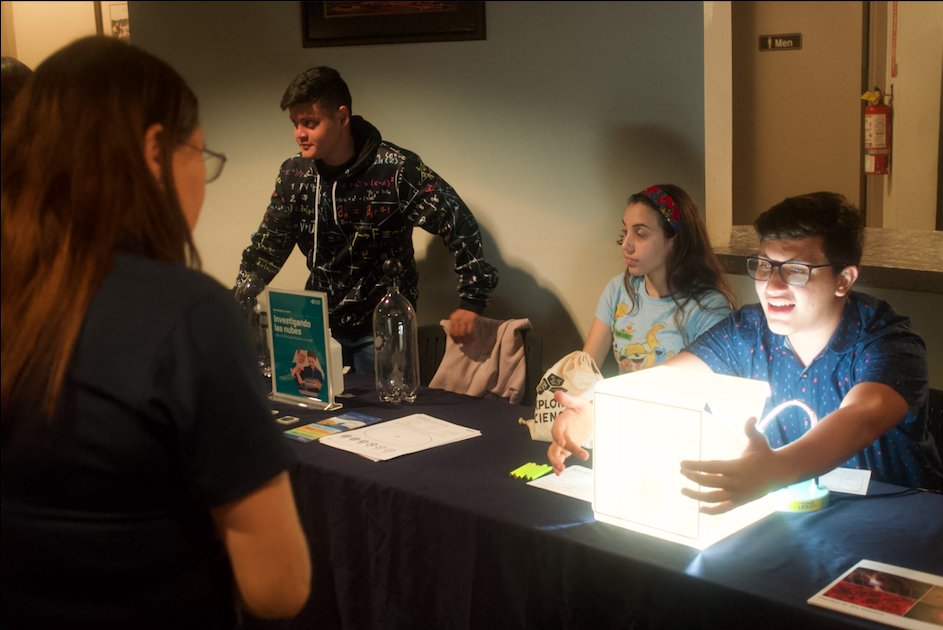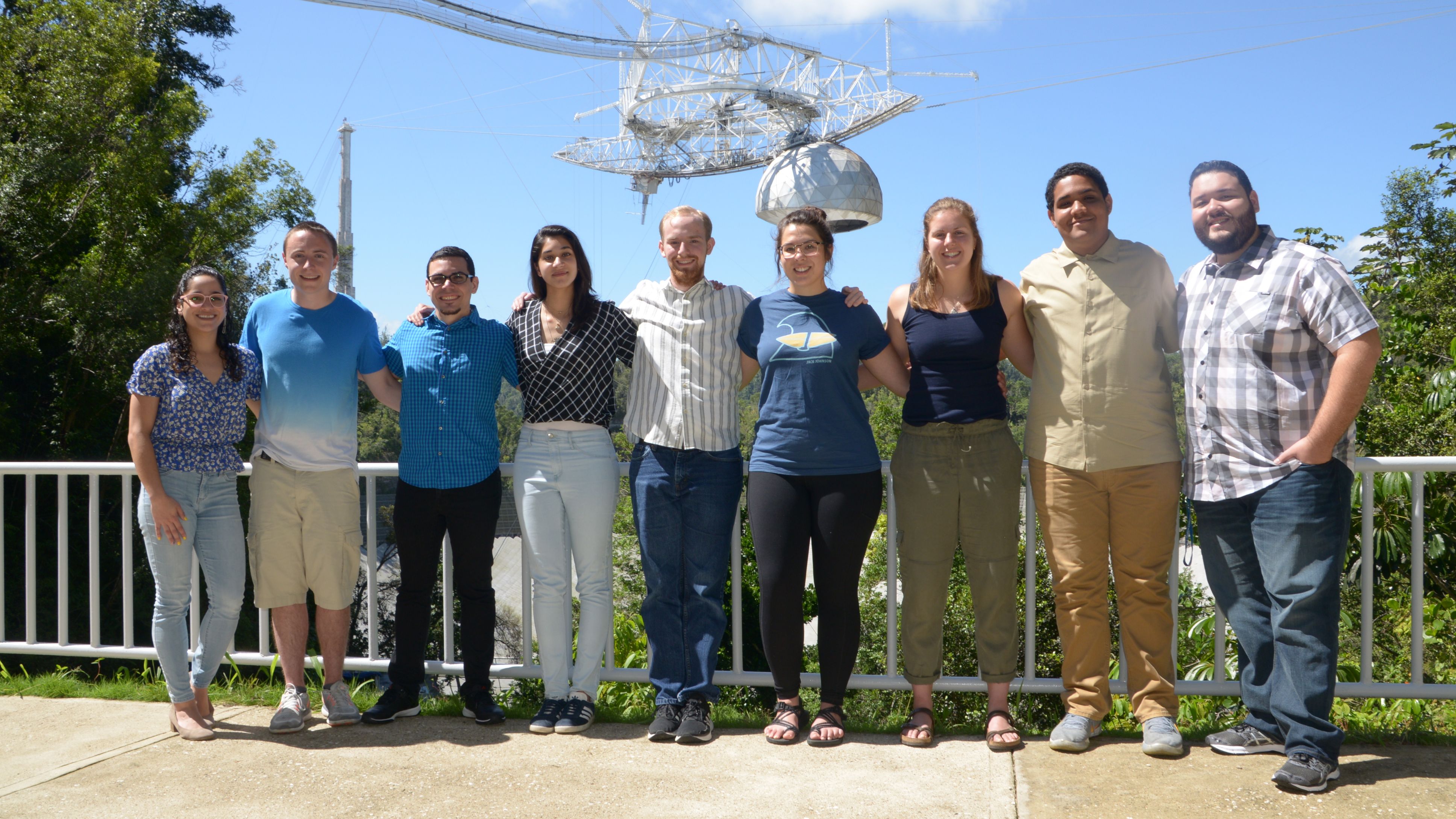
|
|
2019 REUT Students’ Research & Presentations
|
|
|
The 2019 Research Experience for Undergraduates & Teachers (REUT)
program culminated in a number of fantastic research projects that have
been or will be presented at six different conferences across the
country, including the AAS, AGU, SHINE, GMIS, ERN, and DPS.
|
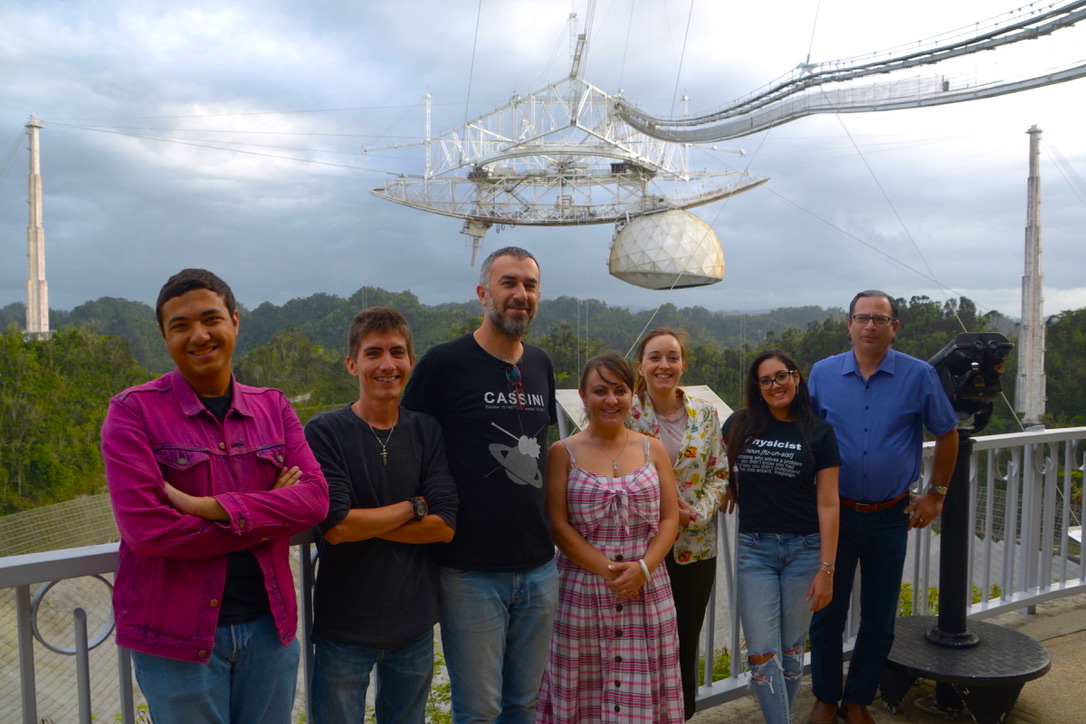
|
|
Arecibo Hosts JWST Training Workshop
|
|
On Feb 20 - 21, the Arecibo Observatory hosted a workshop to train
Puerto Rican astronomers on the software needed to apply for time on
NASA’s James Webb Space Telescope (JWST), which is expected to
launch in March 2021.
+ Read More
|
|
|
|
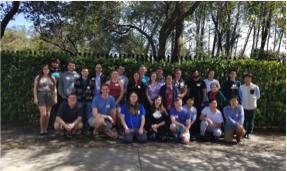
|
|
NANOGrav Workshop Hosted at UCF
|
|
UCF hosted the NANOGrav semi-annual science meeting March 4 - 6th, which
included a hands-on workshop for undergraduate students and a public
talk by Dr. Sarah Vigeland.
+ Read More
|
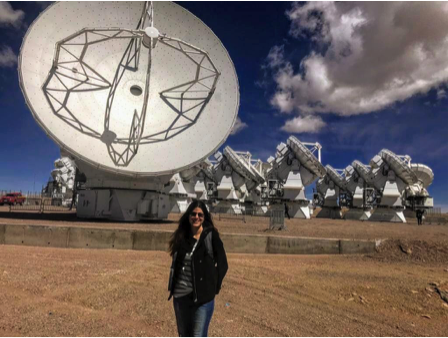
|
|
Planets 2020 Conference
|
|
|
The Planets 2020 conference, hosted on March 2 - 6 in
Chile by the ALMA observatory, was designed to identify synergetic
opportunities between ground- and space-based observatories with
planetary spacecraft missions. AO Research Scientist Dr. Flaviane
Venditti gave a presentation highlighting the planetary radar
program at AO and the many existing partnerships between Arecibo
radar and planetary missions, with an invitation for new, future
collaborative opportunities.
|
|
|
|
Arecibo Observatory Management
Update Regarding COVID-19 Pandemic
|
|
 The Arecibo Observatory’s
priority is the health and
safety of the staff and our
users. In response to COVID-19
and in order to comply with
restrictions implemented by the
Government of Puerto Rico via
executive order OS-2020-23, the
Arecibo observatory will be
implementing the following
workplace changes:
All AO science and science
support staff will be working
remotely beginning on March 16,
2020. We encourage the use of
email if need to contact an AO
staff member.
No visitors will be allowed on
the facility until further
notice. If you planned on
visiting the facility in the
upcoming weeks, please contact
us in order to discuss the
details of your travel
arrangement. +
Read More
The Arecibo Observatory’s
priority is the health and
safety of the staff and our
users. In response to COVID-19
and in order to comply with
restrictions implemented by the
Government of Puerto Rico via
executive order OS-2020-23, the
Arecibo observatory will be
implementing the following
workplace changes:
All AO science and science
support staff will be working
remotely beginning on March 16,
2020. We encourage the use of
email if need to contact an AO
staff member.
No visitors will be allowed on
the facility until further
notice. If you planned on
visiting the facility in the
upcoming weeks, please contact
us in order to discuss the
details of your travel
arrangement. +
Read More
|
|
Update on the Status of AO Following
Earthquakes in Puerto Rico
|
|
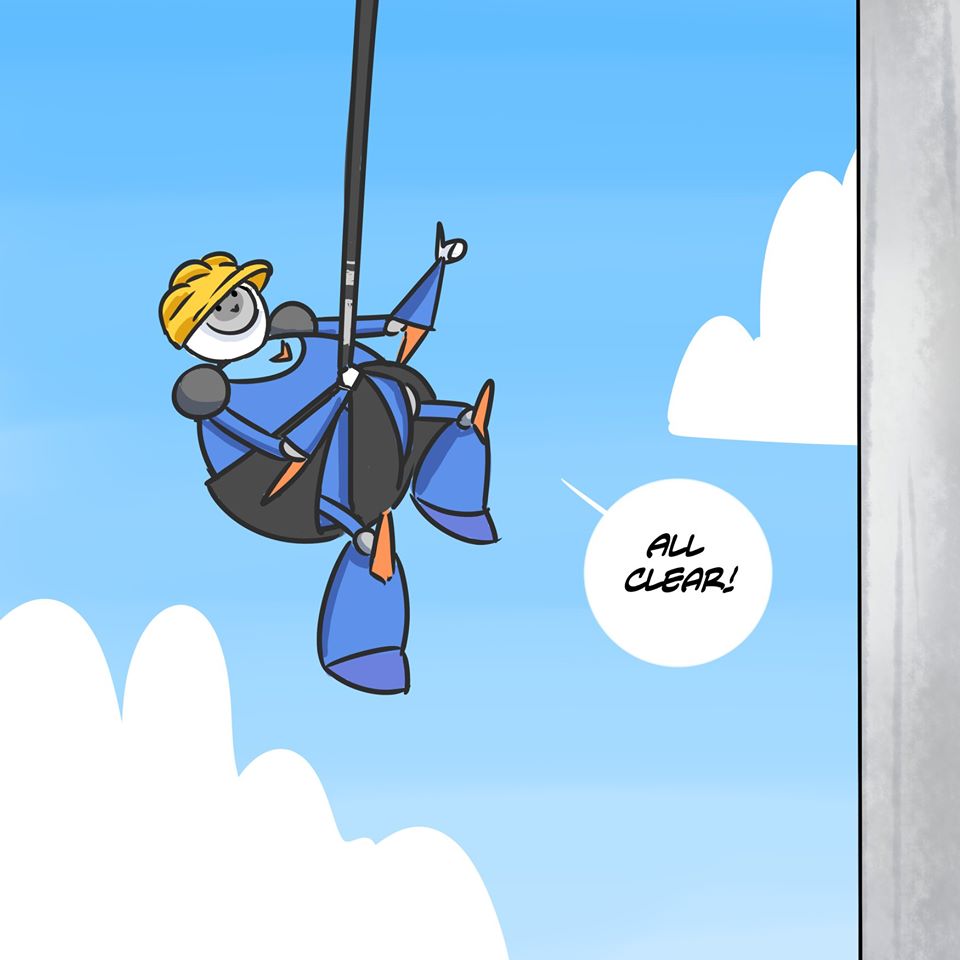 As you know Puerto Rico has been
impacted with a series of
significant earthquakes
throughout the first weeks of
2020. All AO staff members are
safe and our technical teams
have completed preliminary
visual analysis of the primary
structure and have found no
immediate damage.
As you know Puerto Rico has been
impacted with a series of
significant earthquakes
throughout the first weeks of
2020. All AO staff members are
safe and our technical teams
have completed preliminary
visual analysis of the primary
structure and have found no
immediate damage.
"All AO staff members are
safe and our technical teams
have completed preliminary
visual analysis of the primary
structure and have found no
immediate damage/ issues..."
- Eng. Francisco Cordova,
Director of the Arecibo
Observatory
|
|
Status Update on the 430 MHz
Transmitter
|
|
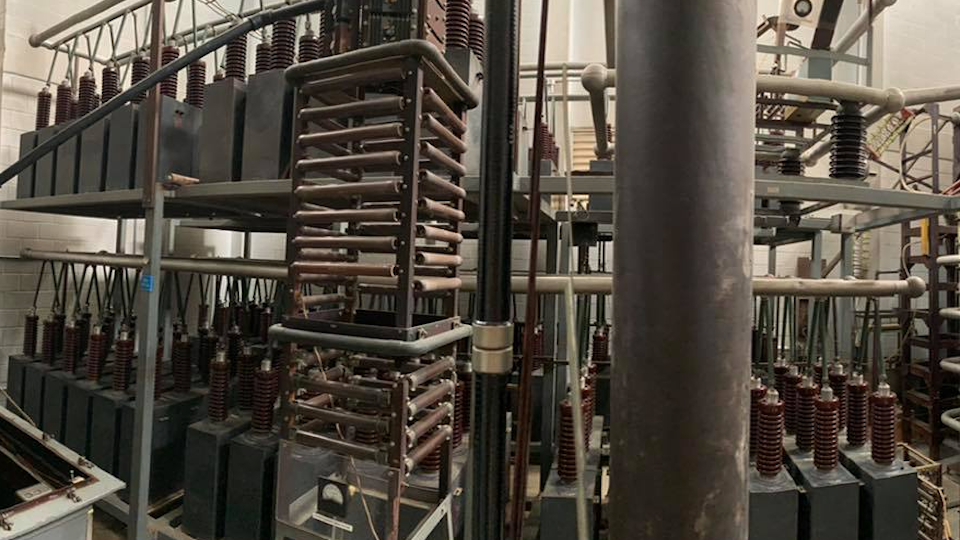 Arecibo’s 430 MHz transmitter
system was shut down in late
2019 following a series of
long-standing issues that were
exacerbated by water damage to
the system during Hurricane
Maria in 2017 and culminated in
the loss of two klystrons due to
transmitter malfunctions in
2019. The AO staff are currently
working with [Diversified
Technologies Inc.] (DTI) to
install a new transmitter system
that will include a solid-state
modulator and a capacitor bank
from the [Sondrestrom Upper
Atmospheric Research Facility].
The expected upgrades will
produce a system with higher
reliability, facilitate future
maintenance, and provide better
protection for the klystrons, in
addition to many other
improvements. We will continue
to share updates on the status
of the new transmitter system.
Arecibo’s 430 MHz transmitter
system was shut down in late
2019 following a series of
long-standing issues that were
exacerbated by water damage to
the system during Hurricane
Maria in 2017 and culminated in
the loss of two klystrons due to
transmitter malfunctions in
2019. The AO staff are currently
working with [Diversified
Technologies Inc.] (DTI) to
install a new transmitter system
that will include a solid-state
modulator and a capacitor bank
from the [Sondrestrom Upper
Atmospheric Research Facility].
The expected upgrades will
produce a system with higher
reliability, facilitate future
maintenance, and provide better
protection for the klystrons, in
addition to many other
improvements. We will continue
to share updates on the status
of the new transmitter system.
|
|
S-Band Transmitter Controller
Upgrades
|
|
We have begun upgrades to the
planetary radar system’s S-Band
transmitter controller at
Arecibo. Continental Electronics
Corporation recently completed a
site visit and we estimate
completion of the upgrades in
CY2021 Q3. All of the S-band
electronics will be replaced in
order to extend the life and
reliability of the transmitter
and monitoring capabilities of
the system. This will allow us
to track the performance of the
transmitter and klystrons
individually and with higher
fidelity.
|
|
|
|
|
|
|
|
|
|
The 2020 AO Colloquium Series is in full swing!
|
On January 21st, Dr. Michael Denton presented “Unsolved Problems in Plasmaspheric
Physics.” Check out his talk and interview here, and read more about Dr. Denton’s
visit here!
On January 28th, Dr. Alain Herique presented “Direct Observations of Small Bodies’
Interiors with Radar Onboard Planetary Probes”. Watch his talk and interview here
and read more about Dr. Herique’s visit here
!
|
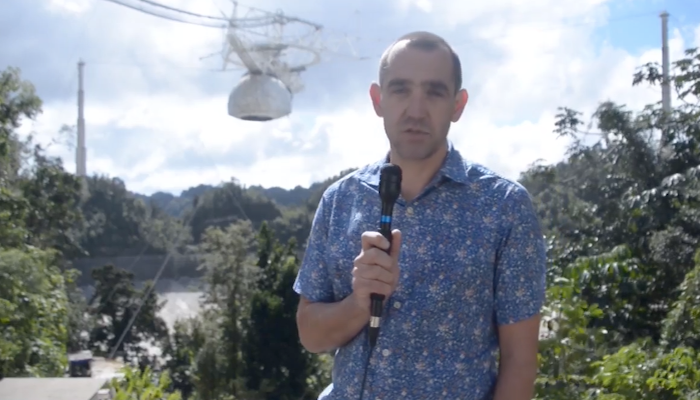
|
|
|
BY Dr. Mike Denton | 21 Jan 2020
|
|
UNSOLVED PROBLEMS IN PLASMASPHERIC PHYSICS
|
|
|
|
|
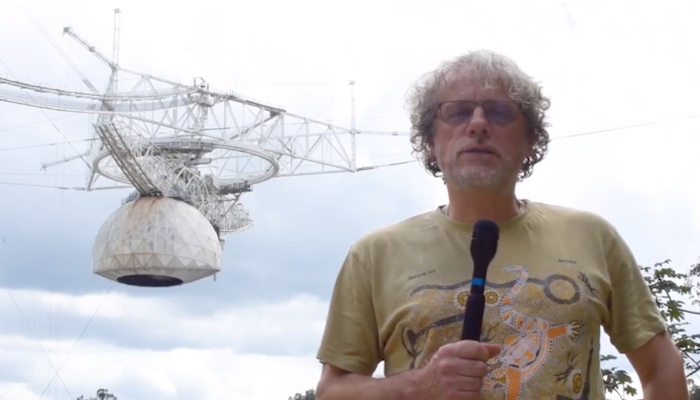
|
|
|
BY Dr. Alain Herique | 28 Jan 2020
|
|
DIRECT OBSERVATIONS OF SMALL BODIES’ INTERIOR WITH RADAR
ONBOARD PLANETARY PROBES
|
|
|
|
|
|
|
|
|
|
|
Education
|
|
AN
ACADEMY OF GROWTH
|
|
|
The STEAM
Teaching at Arecibo (STAR)
Academy welcomes 30 students
from across the island each
semester to provide them with a
pre-college research experience.
“It’s a head start for high
schoolers because it will help
them when entering college, and
further, a career in research,
engineering, or educating future
scientists” said Anne Virkki, PI
of the initiative.
The goal of the AO STAR Academy
is to close the gap between
demand and production within
STEM careers in Puerto Rico. The
fields that are covered in the
program include: Planetary
Sciences; Space Sciences;
Computer Coding; Research
Experience; and Leadership
Skills, with hands-on
activities.
“The experience is a
game-changer in the
participants' life, by
providing the necessary
tools and experience for
their future”, says
Sujeily Santiago, Project
Director in the Arecibo
Observatory.
|
|
|
|
|
|
|
|
|
|
|
|
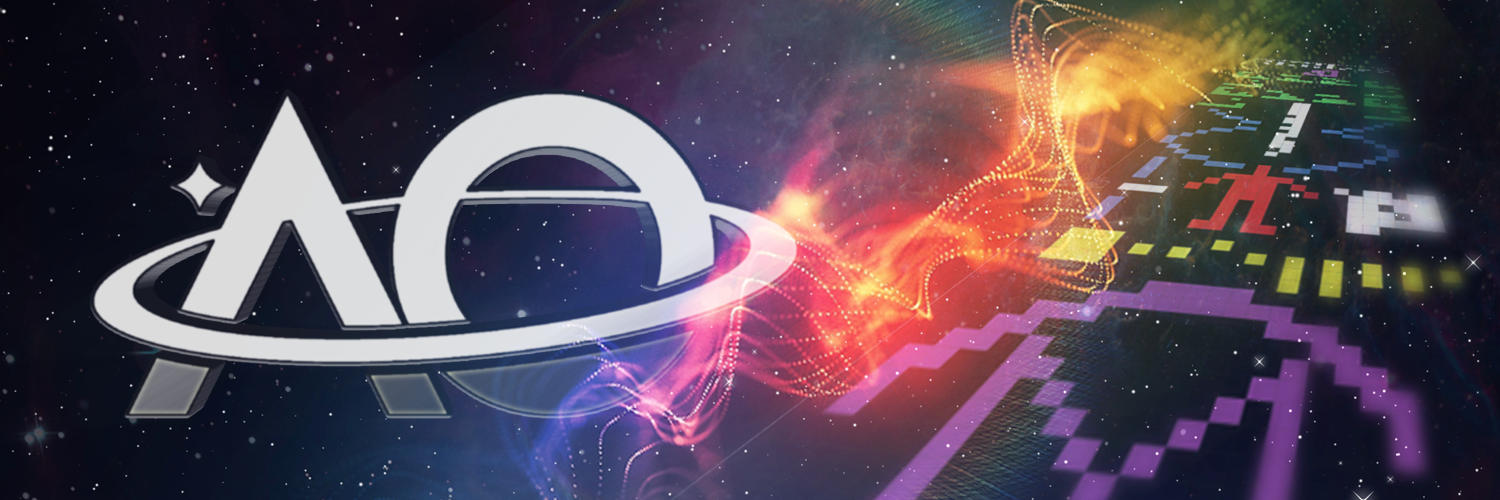
|
|
46 Years of the AO Message
|
|
The New Arecibo Message
|
|
|
|
New Arecibo Message - Global
Challenge is a public engagement
activity, aiming to engage K-16 students
from all over the world in Space related
topics, promoting global collaboration and
enhancing critical thinking and
self-awareness. The challenge seeks
innovative ideas resulting from a global
collaborative effort, led by the youth, to
define an updated message that would
represent the smartest and safest way to say
hello to our possible galactic neighbors,
promoting the peaceful use of Space, and
exploring the cutting-edge technology and
scientific knowledge currently available.
|
|
|
|
|
|
|
|
 The Arecibo
Observatory invites the community with interest in the following topics to contribute or support our
Planetary Science Decadal Survey white papers:
The Arecibo
Observatory invites the community with interest in the following topics to contribute or support our
Planetary Science Decadal Survey white papers:


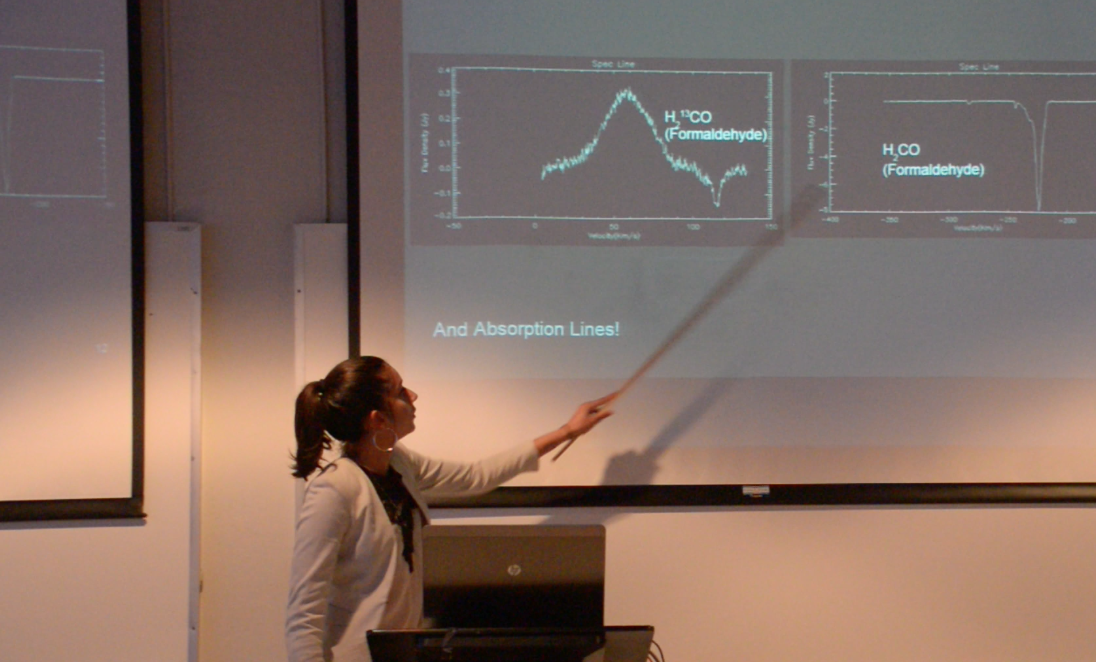
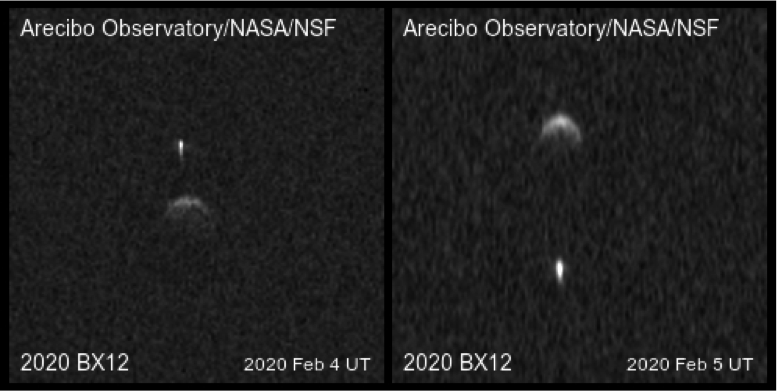
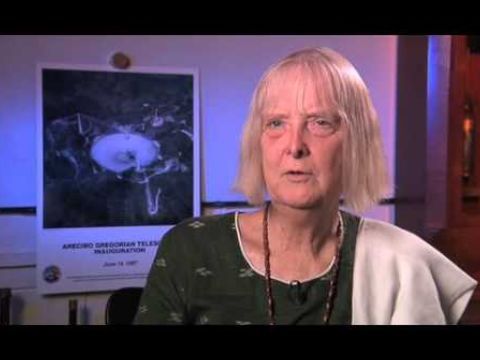
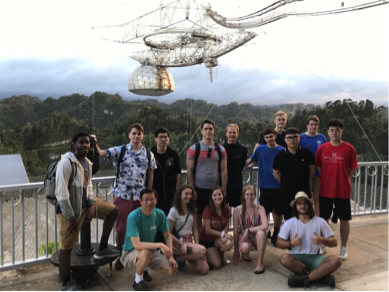
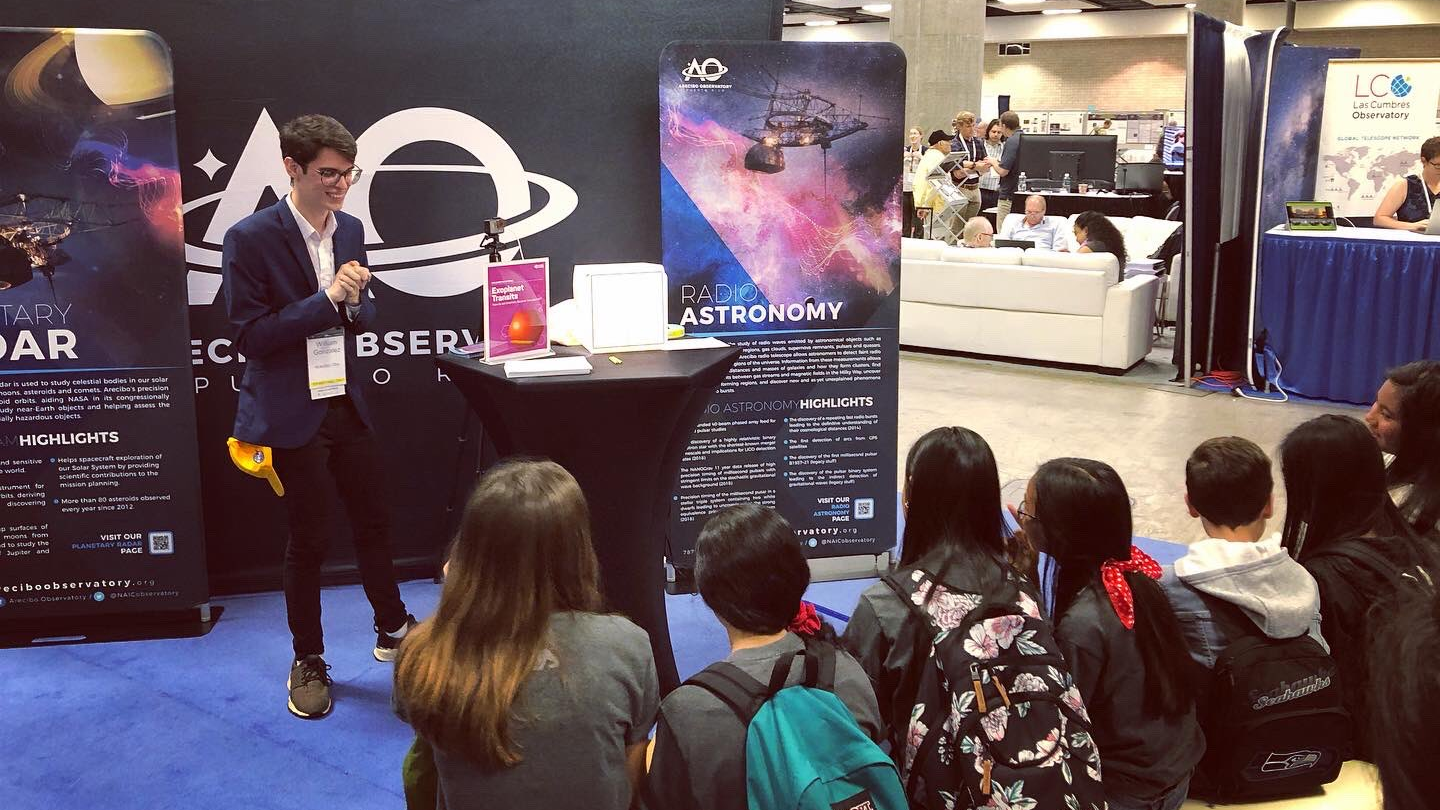
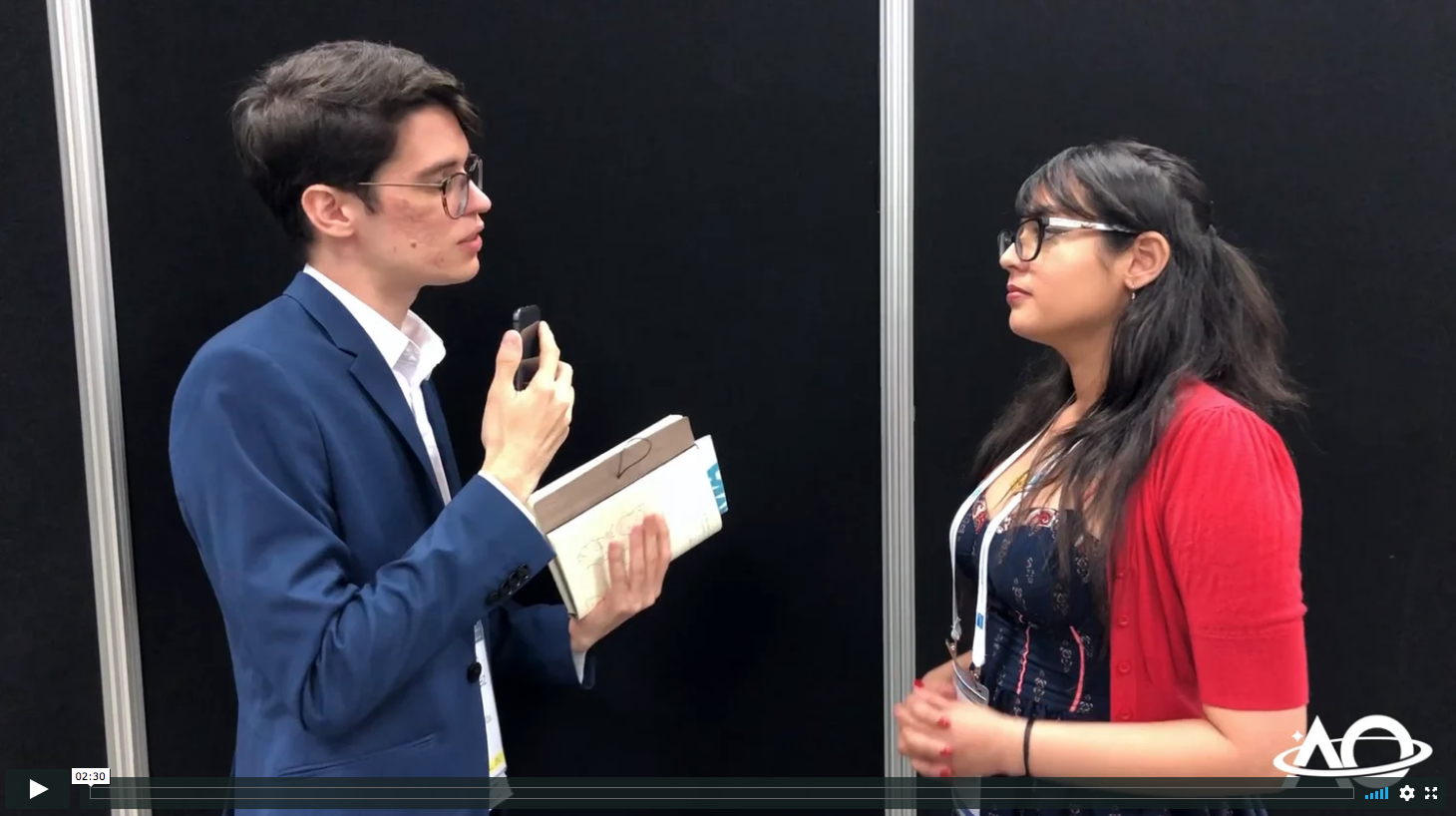
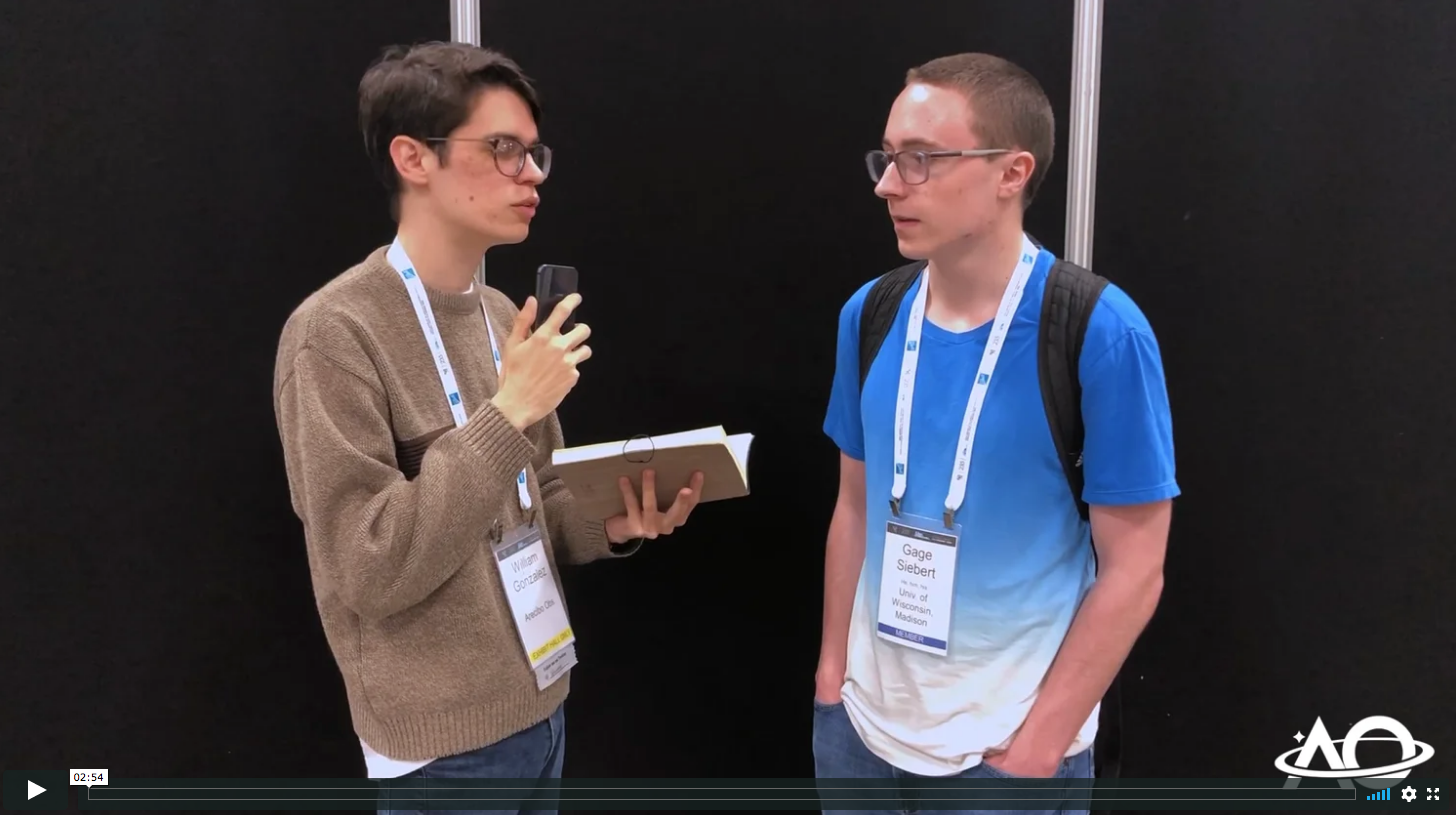




 The Arecibo Observatory’s
priority is the health and
safety of the staff and our
users. In response to COVID-19
and in order to comply with
restrictions implemented by the
Government of Puerto Rico via
executive order OS-2020-23, the
Arecibo observatory will be
implementing the following
workplace changes:
All AO science and science
support staff will be working
remotely beginning on March 16,
2020. We encourage the use of
email if need to contact an AO
staff member.
No visitors will be allowed on
the facility until further
notice. If you planned on
visiting the facility in the
upcoming weeks, please contact
us in order to discuss the
details of your travel
arrangement.
The Arecibo Observatory’s
priority is the health and
safety of the staff and our
users. In response to COVID-19
and in order to comply with
restrictions implemented by the
Government of Puerto Rico via
executive order OS-2020-23, the
Arecibo observatory will be
implementing the following
workplace changes:
All AO science and science
support staff will be working
remotely beginning on March 16,
2020. We encourage the use of
email if need to contact an AO
staff member.
No visitors will be allowed on
the facility until further
notice. If you planned on
visiting the facility in the
upcoming weeks, please contact
us in order to discuss the
details of your travel
arrangement.  As you know Puerto Rico has been
impacted with a series of
significant earthquakes
throughout the first weeks of
2020. All AO staff members are
safe and our technical teams
have completed preliminary
visual analysis of the primary
structure and have found no
immediate damage.
As you know Puerto Rico has been
impacted with a series of
significant earthquakes
throughout the first weeks of
2020. All AO staff members are
safe and our technical teams
have completed preliminary
visual analysis of the primary
structure and have found no
immediate damage.
 Arecibo’s 430 MHz transmitter
system was shut down in late
2019 following a series of
long-standing issues that were
exacerbated by water damage to
the system during Hurricane
Maria in 2017 and culminated in
the loss of two klystrons due to
transmitter malfunctions in
2019. The AO staff are currently
working with [Diversified
Technologies Inc.] (DTI) to
install a new transmitter system
that will include a solid-state
modulator and a capacitor bank
from the [Sondrestrom Upper
Atmospheric Research Facility].
The expected upgrades will
produce a system with higher
reliability, facilitate future
maintenance, and provide better
protection for the klystrons, in
addition to many other
improvements. We will continue
to share updates on the status
of the new transmitter system.
Arecibo’s 430 MHz transmitter
system was shut down in late
2019 following a series of
long-standing issues that were
exacerbated by water damage to
the system during Hurricane
Maria in 2017 and culminated in
the loss of two klystrons due to
transmitter malfunctions in
2019. The AO staff are currently
working with [Diversified
Technologies Inc.] (DTI) to
install a new transmitter system
that will include a solid-state
modulator and a capacitor bank
from the [Sondrestrom Upper
Atmospheric Research Facility].
The expected upgrades will
produce a system with higher
reliability, facilitate future
maintenance, and provide better
protection for the klystrons, in
addition to many other
improvements. We will continue
to share updates on the status
of the new transmitter system.


